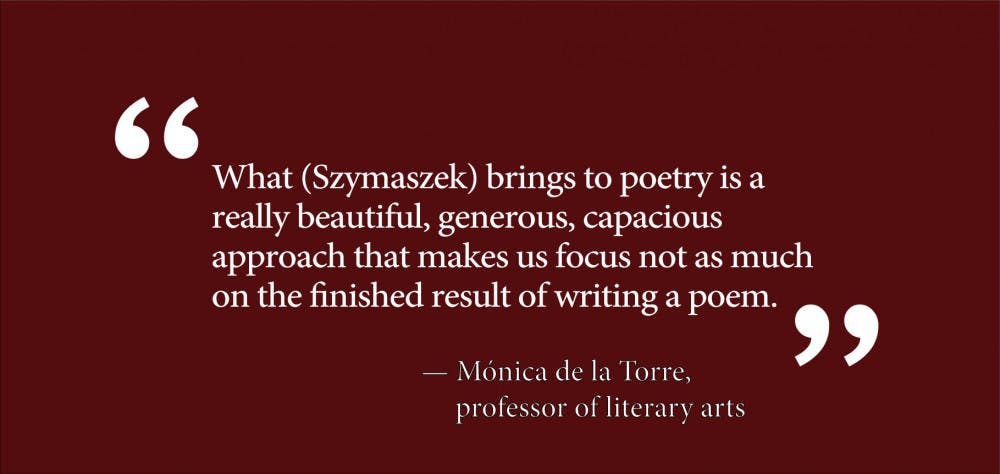The lights were dimmed down with only a single spotlight cast upon Stacy Szymaszek. Other than the occasional grins and brief chuckles from the audience seats, the only sound cutting through the air was her voice. The poet was invited to speak as a guest of the Literary Arts department’s Writers on Writing lecture series. During the one and a half hour reading, everyone listened attentively as Szymaszek read a couple of her recent poems, present excerpts from her book “A Year from Today” and discuss her creative process.
Rather than giving a conventional introduction of Szymaszek, Mónica de la Torre, a professor of Literary Arts, placed her phone close to the microphone to let the audience hear a recording of herself talking about Szymaszek’s work on her way to breakfast. She chose to start the reading this way in an effort to get a “point across that what (Szymaszek) is doing is radical,” de la Torre said. Integrating the sights she sees during her walk, de la Torre introduced Szymaszek in the recording as an author who not only engages with the audience, but also expands the definition of poetry.
Szymaszek, a poet and arts administrator of the Poetry Project, read her presentation on line breaks, which gave insight into her writing process. Among the many aspects of her writing, she touched upon the absence of punctuation in her poetry unless used for rare emphasis.
She further discussed the unconventional square shape of her book “A Year from Today.” This format was the result of an unwillingness to compromise the structure of her poems to be more compatible with commercial publication.
After her reading, there was a brief Q&A session for the audience to satisfy its curiosity on Szymaszek’s writing. When asked about the frequent religious references in her poetry, she answered that she “really wanted to be Catholic” but “always felt rejected” by religious institutions. Rather, she felt “like poetry was a calling for (her),” she explained, adding that she had always liked the symbolism and “drama” that religion entails.
The performance left many readers with long-lasting impressions and thoughtful reflections. Akua Afari ’22, who is also a student of the LITR 0710: “Writers on Writing” first-year seminar, said that “it was quite interesting how she aestheticized mundane things.” Because the subject of Szymaszek’s poetry takes root in everyday life, it allows the audience “to see the beauty of it,” Afari said, and to further appreciate “how much is put into creating art,” she added.
“What she brings to poetry is a really beautiful, generous, capacious approach that makes us focus not as much on the finished result of writing a poem. It’s not about individual poems and what they accomplish, but about the practice of poetry as a lived thing,” de la Torre said.





